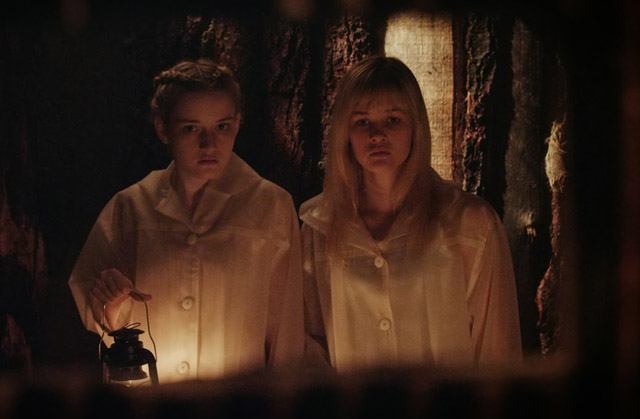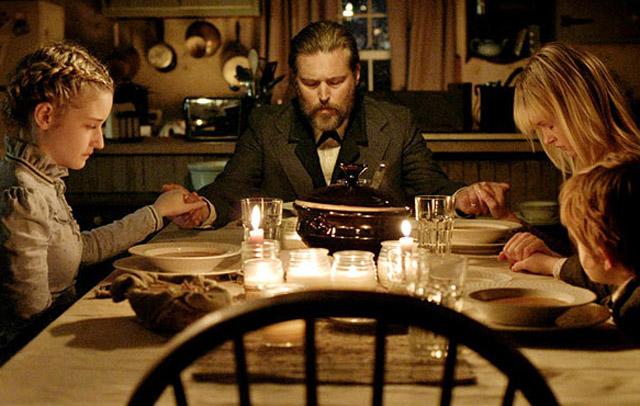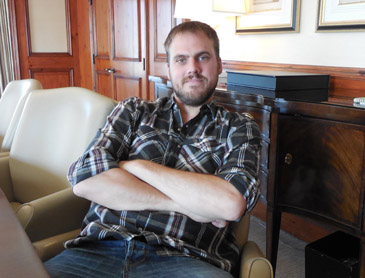CHICAGO – The Steppenwolf Theatre of Chicago continues to provide different viewpoints on the American stage, and their latest “Little Bear Ridge Road” is no exception. Featuring ensemble member Laurie Metcalf, it’s the resonate story of a family at the crossroads. For tickets/details, click LITTLE BEAR.
Interview: Director Jim Mickle of ‘We Are What We Are’
CHICAGO – One of the more unique horror film stories is in the upcoming release of “We Are What We Are,” a re-imagining of a 2010 Mexican film, co-written and directed by Jim Mickle. In moving the story to America, Mickle changes the mood of how the rituals transpire, and attaches those rituals to extreme religion.
The story is about two adolescent girts and their younger brother, quarantined inside a home with an ultra-religious father (Bill Sage) and mother. When the mother dies trying to prepare for a weather emergency that turns into a flood, the house is suddenly exposed to outside influences. The film expresses several dark themes, with a psychology that is rooted in the mythos and delusions of off-the-track religious interpretations.
 Photo credit: Entertainment One |
The mastermind behind this unusual premise is Jim Mickle, who directed the film and co-wrote the screenplay with Nick Damici. This is Mickle’s third feature film, after the well-received cult movies “Mulberry Street” and “Stake Land.” In anticipation of the release of “We Are What We Are,” Mickle sat down with HollywoodChicago.com to talk about the elements that made this narrative exploration of faith a little different than most horror films.
HollywoodChicago.com: What frightens you about the type of religious sect you portrayed in ‘We Are What We Are’?
Jim Mickle: I think that the characters are able to justify horrible things by thinking that God allows it, or tells them to do it. I think that is what scary about any organized religion. People start acting not in their own best interests, or the best interests of others, but they subscribe to something that not everyone subscribes to.
HollywoodChicago.com: Do you see a danger in that in our current society, especially as religions gain more power?
Mickle: Absolutely, more so on how religion creeps into government and politics, we’ve seen how that creates problems in the Middle East. And we have our own homegrown version, that we don’t think of as fanatical, but that fanaticism is infiltrating us as well. One that starts to come into politics, it gets scary, because it can impinge on other peoples’ lives who don’t necessarily agree.
HollywoodChicago.com: In the film, there is the symbol of the flood, both in the rain to wash away sins and invocation of Noah. How else do you define the use of water in the context of the film?
Mickle: I believe it lies in the truth that nature always wins. As much as humans fight back, nature reclaims itself. I’m fascinated with the ebb and flow, the power of nature. It’s the rhythms that nature possesses, there is something beautifully harmonious how it recycles itself.
HollywoodChicago.com: What was the origin for the idea of the religious cult, and the ritual they practice within that religion?
Mickle: We started with the ritual, knowing we wanted to use that somehow. Part of the whole creative process is that you have things you want to talk about, and are floating around. As the story develops, you find a way to use that – sometimes it fits, and sometimes it doesn’t – but in this case everything fit together quite nicely.
HollywoodChicago.com: This is based on a Mexican film from 2010, with the same title. How was your film different that the original?
Mickle: It had the same ritual, but it was vague. It’s a different film, with a father who dies in the beginning, and two sons who have to step up to help their mother, to replace father in the household. The mother disappears, and the two boys are in competition. It’s also set in Mexico City, so the whole atmosphere is completely different from our film. We injected more of an American religion upon it. That was the interesting thing about exploring it, we looked into the links of that religious influence.
 Photo credit: Entertainment One |
HollywoodChicago.com: Your previous two features films – ‘Stake Land’ and ‘Mulberry Street’ were both post-apocalyptic. In your opinion, do you think the society we live in currently is devolving toward such a post apocalyptic event?
Mickle: I do, but I’m not sure it will happen in our lifetime. I don’t know if it’s my wish fulfillment, since I’ve made post apocalyptic stories. It just that I feel we have gone down some wrong paths, in a way. – environmentally, socially, economically, the way cities are so contained and focused. It may be about the fantasy of starting over as well, I don’t know. [laughs]
HollywoodChicago.com: In your career, you’ve been a crew member on a number of independent films. Which set taught you the most about your own style of the director you eventually became?
Mickle: It was a film that was never released, called ‘Chasing the Dragon,’ in 1999. Not because it was an exception film or process, but it was the first one I really worked on closely. It was between my Freshman and Sophomore year of college, I spent that summer in Little Rock, Arkansas, on the film. It was a medium level budget, about two million, and I was the storyboard artist. I started with the director, the cinematographer and myself – I would take notes on what they said each day, and go back and storyboard those notes at night.
It was six or eight weeks on pre-production, and I saw the entire process from the director to the last shot. Once it began shooting, I joined the art department, and worked on the props and other elements. It was a true beginning to end process.
HollywoodChicago.com: Was was the main revelation you had about filmmaking in that type of experience, since at that point you were a student?
Mickle: I went back to campus and said, ‘guys, it’s not like anything they’ve taught us.’ [laughs] It was an independent film, everyone is a freelancer and there was a lot of partying. I saw all the politics, who was made at who, so that was my real education.
HollywoodChicago.com: Well, since you have roots as a storyboard artist, as a director do you use the same technique as Alfred Hitchcock, in which you map out the entire movie on a storyboard beforehand?
 Jim Mickle in Chicago, October 1st, 2013 Photo credit: Patrick McDonald for HollywoodChicago.com |
Mickle: I did do that, but I have evolved away from it. My Senior year film was done exactly like that, and it wound up beautiful, with a perfect flow to it – every frame looked like what I drew on the board. But it was really stiff. I’ve adapted the technique as I’ve gone along, and for example shot ‘Mulberry Street’ in the exact opposite manner, with three cameras shooting everything. As I’ve gone along, I’ve found a middle ground.
HollywoodChicago.com: There is an element in your film about emerging sexuality in the two teenage girls in the film, as a rebellion against their strict religion. Did you think about that in the way the film was cast, and the atmosphere you wanted to develop?
Mickle: It’s funny, because there was more of that in an earlier draft of the script, but I don’t think it’s as much a sexuality emerging as it is just Iris [the older sister] doing what she felt like she had to do at her age. That seemed more tragic to me.
HollywoodChicago.com: You had distinct character casting – every person’s look seem to fit their role. In the process of putting that together, was it specific types you were looking for or were you allowing it to happen in the audition process.
Mickle: We mostly picked everyone ourselves, only using audition for the father character. The person who was cast, Bill Sage, was the first one to come in and that pretty much was that. His work was such that I actually saw him in something and said to the casting director, ‘we need someone like Bill Sage.’ She said, ‘well, how about Bill Sage?’ I thought he was too good looking, too chisel, but he came in to read and I knew he was the one.
HollywoodChicago.com: What were your horror influences as you were growing up, and why did you know you wanted to pursue the genre for your work?
Mickle: The Evil Dead trilogy, ‘Army of Darkness,’ ‘Bad Taste,’ ‘Dead Alive’ and the Peter Jackson movies – I had a period in which I was very interested in special effects. That factored back around to ‘The Thing’ [1982] and the work of Rob Bottin [Special Make-up Effects Creator]. That’s when I was interested in what horror could do by mixing other genres. That led me down to the road of becoming more serious about what I wanted to do.
 | By PATRICK McDONALD |


